
Reimagining Career Services
Rethinking our approach to work and learning
Canada’s world of work is shifting rapidly. Automation, the rise of gig work, climate change, the pandemic, an aging populace, and beyond are reshaping how people build careers and how employers sustain their workforce.
These changes have exposed deep gaps in our employment ecosystem: services that don’t meet the needs of today’s workers, employers struggling without adequate support, and practitioners asked to do more without the tools and training to succeed.
Where the ecosystem falls short
Our current ecosystem fails to meet the full needs of four key groups:
- Individuals facing complex barriers. Many unemployed Canadians experience intersecting challenges, such as poor health, unstable housing, limited childcare, and financial insecurity. Existing employment services often prioritize rapid job placement over long-term stability, pushing people into low-wage or precarious roles that don’t address their underlying needs and can lead to repeated cycles of unemployment.
- Mid-career workers. Canadians in their 30s, 40s, and 50s are increasingly expected to reskill, adapt to automation, or transition into new industries. Yet current systems rarely support career pivots while people remain employed. Services are often only available once workers lose their jobs, leaving those in precarious or disrupted sectors without proactive guidance.
- Small- and medium-sized enterprises (SMEs). SMEs make up over 90% of Canadian businesses and employ two-thirds of the private-sector workforce, but many lack the resources for structured workforce planning. Without accessible, affordable tools and services, many struggle with recruitment, retention, and training—pressures that have only grown in the wake of the pandemic and ongoing labour shortages.
- Career development practitioners (CDPs). CDPs provide critical guidance to Canadians navigating disruption, but their profession remains fragmented and under-resourced. Training and professional development opportunities are inconsistent, national standards are only emerging, and recognition of their role is limited. Without stronger supports, practitioners cannot fully meet the increasingly complex needs of the workers and employers they serve.
A portfolio of innovation
In response to these shortcomings, Blueprint launched the Re-imagining Career Services (RCS) initiative with funding from the Future Skills Centre (FSC).
Rather than a single solution, RCS is testing multiple new models to serve different parts of the system—unemployed individuals with complex barriers, mid-career workers navigating transitions, SMEs addressing recruitment and retention, and practitioners who guide Canadians through disruption. Each project is co-designed with partners on the ground, piloted in real-world contexts, and evaluated to generate evidence on what works and what doesn’t.

RCS Phase One (January to July 2021)
In 2021, Blueprint engaged a multi-disciplinary team of Canadian and international subject-matter experts and thought leaders to identify gaps and needs, explore alternatives, and provide actionable insights to help Canadians navigate the future of work. We captured these findings in nine richly detailed research papers and in a summative research brief.

RCS Phase Two (April 2022 to 2027)
Recognizing that change needs to happen throughout the system, Blueprint launched transformative work streams to put our research into practice. Throughout Phase Two, we’re working with partners to identify, design, and test promising career service innovations to generate evidence on what works, what doesn’t, and to share evidence and insights with the sector.
We have four novel service models helping to shape career services of the future: Pathways to Opportunity, Mid-career Transitions, Thriving Workplaces, and the Career Development Professional Centre.
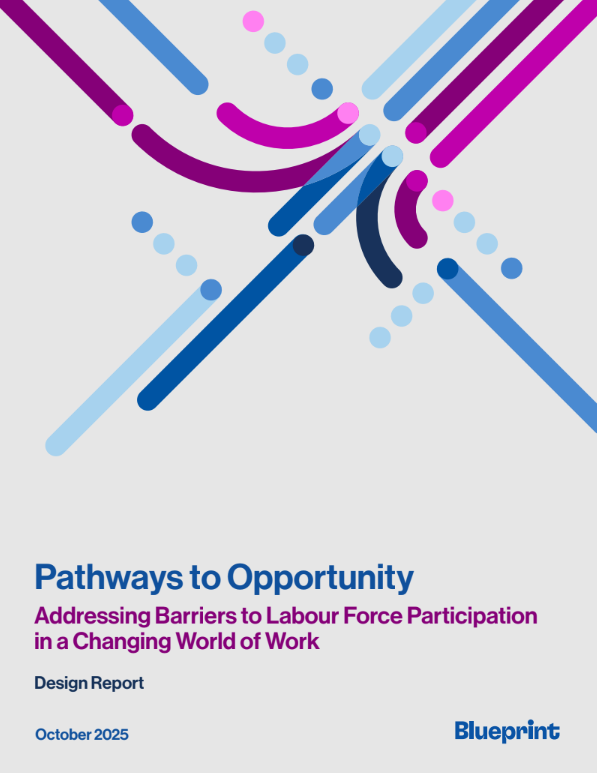
Pathways to Opportunity
Launched in Ontario with partners WoodGreen Community Services, The Neighbourhood Group, Bruce County, and YMCA Owen Sound Grey Bruce, Pathways to Opportunity (PtO) supports social assistance clients facing complex barriers to employment. The pilot combines personalized coaching, financial empowerment, skills development, wraparound supports, and incentives to help participants transition from Ontario Works to sustainable employment. PtO is testing a comprehensive, evidence-informed model to strengthen employment services and expand opportunities for individuals with low incomes.





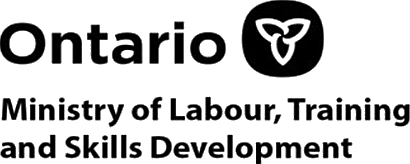

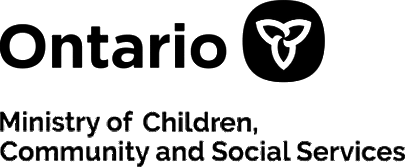
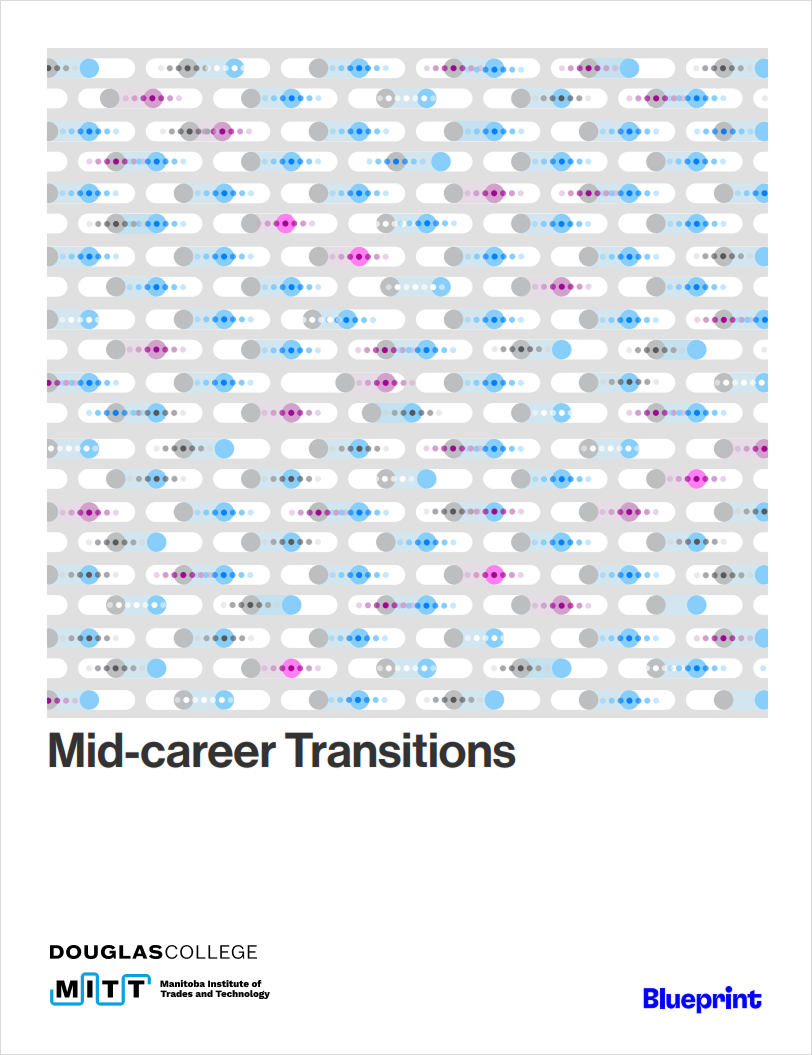
Mid-Career Transitions
In partnership with Douglas College (BC) and the Manitoba Institute of Trades and Technology (MITT), Mid-career Transitions is testing dual-client service models that support both mid-career workers and SMEs. Using co-design and prototyping, the project is piloting tailored services—group-based workshops, one-on-one counselling, and employer engagement strategies—that help workers navigate career changes while meeting employer workforce needs. The project is breaking new ground in designing responsive, scalable career services for working Canadians.


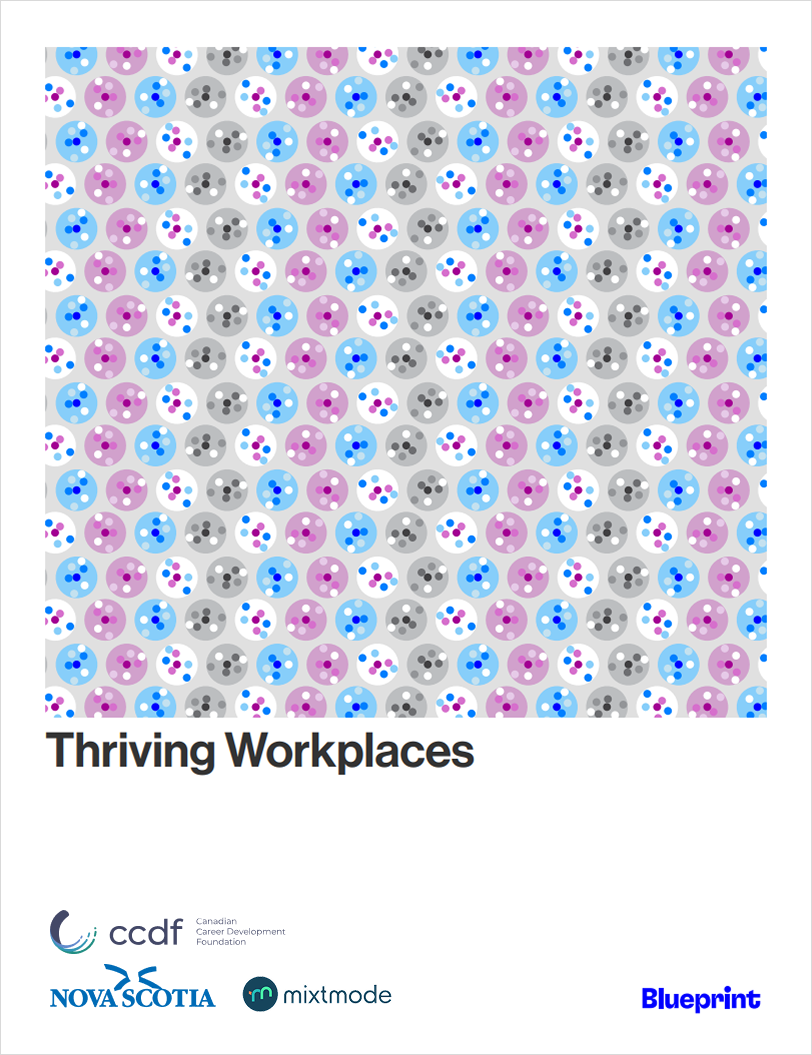
Thriving Workplaces
Led by MixtMode Consulting, the Canadian Career Development Foundation, and the Government of Nova Scotia, Thriving Workplaces is pioneering a dual-client model delivered through Nova Scotia Works. Drawing on extensive user research with SMEs and workers, the project applies an innovative “Magnetic Factors” framework to align worker and employer needs in recruitment, retention, and workplace culture. Currently piloted at Nova Scotia Works sites, this project is reimagining how public employment services can strengthen small businesses, foster retention, and create thriving workplaces.


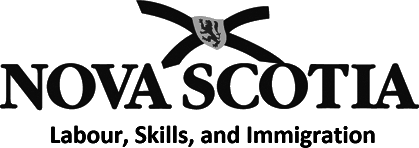

The Career Development Professional Centre (CDPC)
In collaboration with the Canadian Career Development Foundation and MixtMode Consulting, Blueprint is building the Career Development Professional Centre (CDPC)—a pan-Canadian, virtual centre of excellence for career practitioners. With thousands already engaged, the CDPC provides training, resources, a national community of practice, and Canada’s first national certification system for practitioners. This initiative is professionalizing the field, equipping practitioners with new skills and tools, and ensuring Canadians can access high-quality career guidance in a changing economy.


A portfolio for the future of work
By experimenting across this range of challenges, RCS is helping to rebalance the employment ecosystem. The portfolio is building knowledge, capacity, and new service models that can inform how Canada better supports workers, employers, and practitioners in the years ahead—ensuring that our employment system is inclusive, responsive, and ready for the future of work.
Phase One Research Briefs

Responsive Career Pathways Research Brief: Guiding Careers for the Future
By Michelle Zhong, Natalie Conte, Kelly Pasolli, and Zainab Yusuf
The Responsive Career Pathways Research Brief consolidates key findings from our past 9 research papers in partnership with the Future Skills Centre. In this brief, we outline key innovation challenges and opportunities for career guidance services in Canada, and highlight common barriers to accessing these services.

Breaking Down Barriers to Career Development
Jasmine Irwin, Adrienne Lipsey, and Samantha Coronel
Career guidance systems could be designed with a whole-of-person lens. This paper considers promising practices in breaking down barriers to career guidance for Canadians.

Navigating Canada’s Messy Education and Training Marketplace for Career-Focused Learning
by André Côté, Danielle Olsen, and Jake Hirsch-Allen
Adult learners have to navigate an increasingly diverse, fragmented and complex education and training marketplace. This paper assesses options helping Canadian learners navigate their education and learning choices.

Diversity, Equity and Inclusion in Responsive Career Pathways
by Michelle Zhong and Tanvi Shetty
The path to accessing career guidance is challenging for racialized people, women and newcomers to Canada. This paper offers opportunities to strengthen our publicly-funded employment systems to effectively address labour market inequity.

Use of Technology and Tools in Responsive Career Pathways
by Ben Berres
The role and use of technologies that help individuals and career practitioners navigate career pathways are rapidly evolving. This paper outlines potential ways responsive career pathways can be enabled by technology.

Applying Behavioural Insights to Career Guidance
by Sasha Tregebov, Andreea Seusan, and Michelle Krieger
Offering forward-looking, customized, high-quality and accessible career guidance to a wide range of Canadians is possible. This paper identifies behavioural and motivational barriers to accessing career guidance and offers a promising path ahead.

The Career Development Profession in Canada and the Emergence of Online/Multi-Modal Practice Delivery
by Jenny Bimrose and Tannis Goddard
Career development practitioners have a critical role to play in helping Canadians prepare for the future of work. This paper tackles questions about the role of career development practitioners and the evolution of their practice.

The Role of Employers in Responsive Career Pathways
by Kelly Pasolli and Steve Cumming
Employers are critical in establishing more responsive career pathways for Canadians. This paper outlines some of the challenges and opportunities employers are facing related to the future of work and skills.

A Roadmap for Change: Building Responsive Career Pathways in a Post-Pandemic World
by Sandra McKenzie and Tannis Goddard
This paper offers considerations for strengthening and aligning our careers and employment systems to better serve Canadians across their career trajectory.

Glossary of Terms

Labour Market Information in Responsive Career Pathways
by Mustafa Sayedi and Aryeh Ansel
Finding ways to make labour market information accessible and useful for service providers and individuals is key for creating more responsive career pathways.
Phase One Design Report
Our Design Report describes initial launch of the RCS initiative: how it was developed, what challenges each intervention is addressing, and why it matters for Canada. We outline our overall approach to RCS and how it differs from traditional approaches, introducing Blueprint’s learning agenda and our evidence generation methodologies for addressing the research questions.
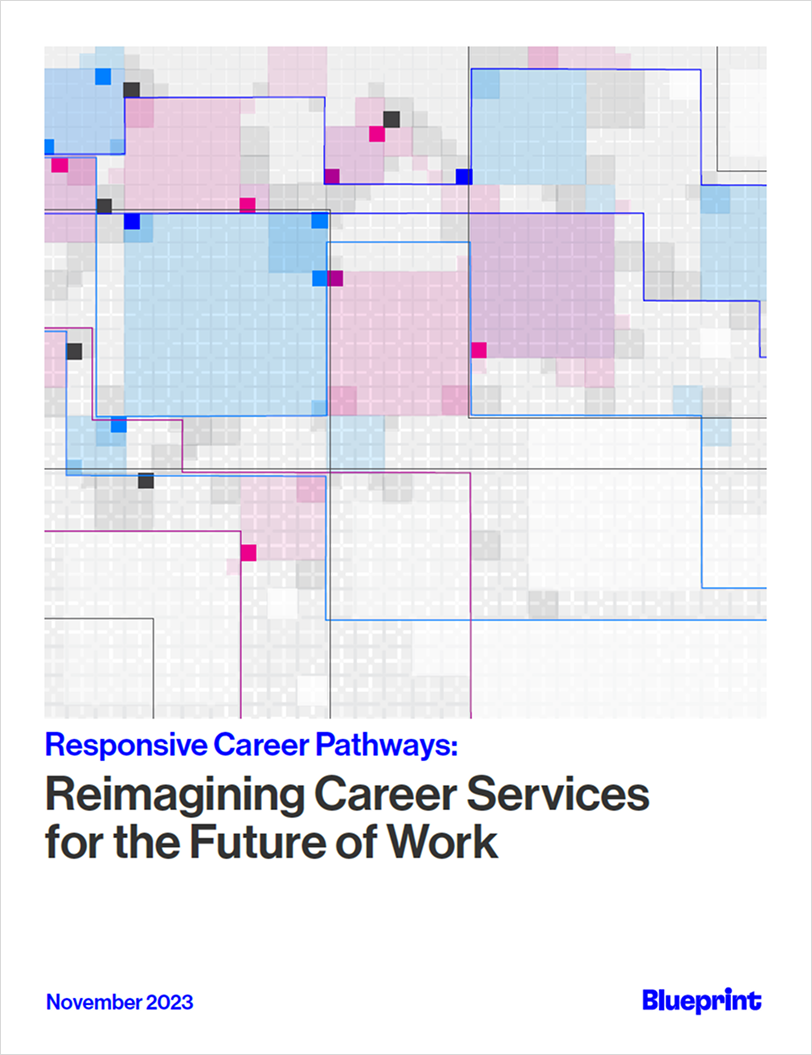
Reimagining Career Services for the Future of Work
Our Design Report describes initial launch of the RCS initiative: how it was developed, what challenges each intervention is addressing, and why it matters for Canada. We outline our overall approach to RCS and how it differs from traditional approaches, introducing Blueprint’s learning agenda and our evidence generation methodologies for addressing the research questions.
Motivating Midcareer Reskilling: Request for Expressions of Interest
Motivating Midcareer Reskilling is a research project led by Blueprint and funded by the FSC. This project will investigate whether midcareer workers are willing to invest in skills development using an online survey combined with an incentive-compatible economic experiment. Blueprint is seeking expressions of interest from qualified firms in Canada to support the implementation and operational delivery of the survey-experiment.
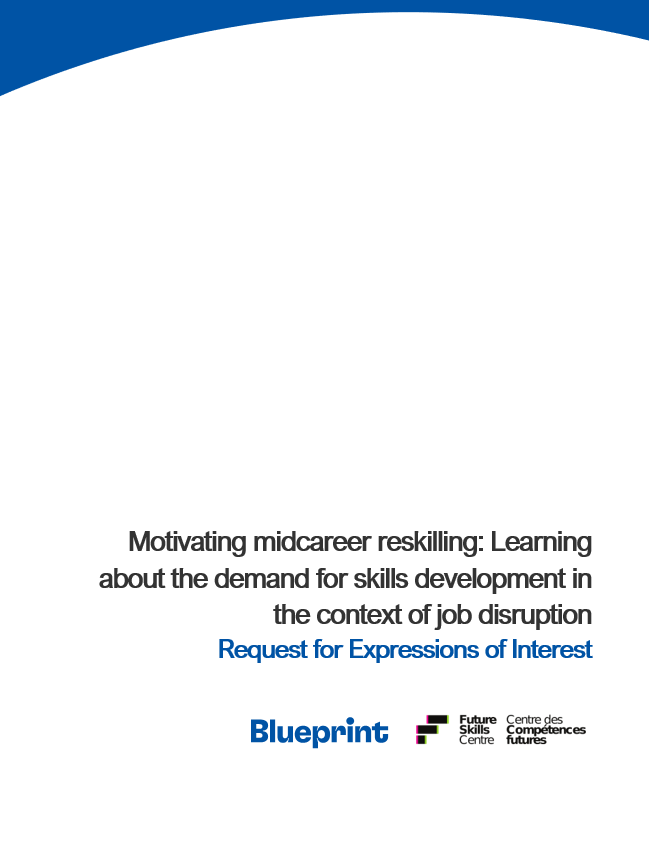
Motivating Midcareer Reskilling: Request for Expressions of Interest
Blueprint is seeking expressions of interest from qualified firms in Canada to support the implementation and operational delivery of the survey-experiment. We are seeking a vendor to implement the survey-experiment, including survey programming, participant recruitment, incentive administration, and delivery of individual-level anonymized data. The research design, experimental framework, and analysis will be developed and conducted by Blueprint. Responses from interested vendors will be used to assess feasibility, capacity, and indicative approaches and inform a subsequent procurement process.
Submission deadline: February 23, 2026 | 9 a.m. EST

